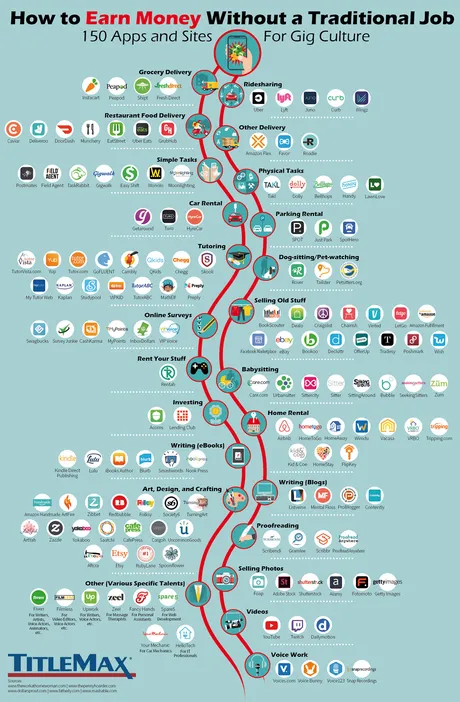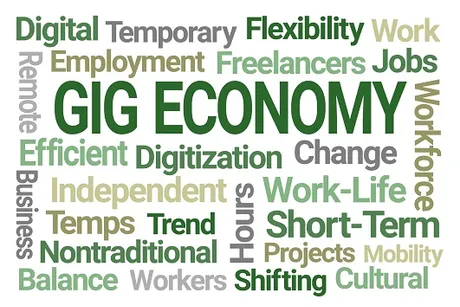
A gig economy is a free market system in which temporary positions are common and organizations hire independent workers for short-term commitments. The term "gig" is a slang word for a job that lasts a specified period of time; it is typically used by musicians.
Indeed, 'gig' used to be something that pretty much only musicians said. They'd get paid to play one time (or a handful of times) and that was it, off to find the next gig. However, with the advent of the Internet, smartphones, and GPS, an entirely new gig economy was forged.
Apps that could have never existed otherwise started to pop up.

You can use your own car to give people rides as a taxi service though Uber & Lyft. You can rummage garage sales, Salvation Army, Good Will, etc., and flip underpriced goods on Ebay or other sites (my brother does this). You can write a blog... yada yada yada.
Tipping point is near.
There will come a time in the near future where it doesn't make a lot of sense for citizens to work for minimum wage when they can pick and choose a variety of options that pay significantly more. No boss to answer to, choose your own hours, make more money. The gig economy is a dream come true for a select handful of individuals.
With the advent of cryptocurrency, the gig economy can only increase in size and stature. Blockchain is a robust but inefficient database, and the work created from that inefficient database will also be robust yet inefficient. This inefficiency is going to create a lot of jobs in a time when jobs are scarce and not very competitive. Supply, meet demand.
Over the next ten years, automation is going to choke out the job market quite forcefully. Millions of citizens will be displaced. It will be like creating refugees within the borders of our own country. Universal basic income is not the answer; a network of trust is required to redistribute wealth, power, and resources back into a system on its last legs.

Society has reached the point of maximum diminishing returns. Up until now it's been nothing but centralization, streamlining logistics, and maximum efficiency. Those days are done. Centralization has reached peak usefulness, because no matter how much value we generate from here all value created skyrockets straight to the top of the pyramid. The pyramid has lost its shape and is doomed to collapse from inversion.

Technology has now reached a point where maximum efficiency is no longer necessary. I've lived during a time when the megabytes of storage of the past were far more expensive than terabytes of storage today. That's an x1,000,000 gain. Technology is explosive and exponential, and now money itself will be explosive and exponential.
Even today none of the crypto dev teams seem to "get it". Every crypto dev team is a quarantined centralized entity. Luckily the code created is open source and can be used by others, but still the organization of this emergent cooperative is embarrassingly incorrect.
Imagine a project that is truly decentralized. When one asks the question: "Who is the dev team?" There shouldn't be an answer. These dev teams should be spread out all across the globe working on common goals and governed by a decentralized system that hasn't even been thought up yet.
Yes, it would be EXTREMELY inefficient for a dozen devs around the globe to all be cranking out the same code or reviewing each other's work. That's the entire point. We are sacrificing efficiency and this whole Just-get-it-up-and-running-ASAP model for a system that is far more robust and clean-cut than anything a corporation could create. The entire world runs Linux in the background for a reason, just like the entire world will run crypto in the background and ordinary citizens will be none the wiser.
Again, looking at the physical production side of things, a hundred different people booting up a mini-factory in their garage to produce a finished product is highly inefficient. Why not just create a centralized factory that does all the work in one place? We already tried that model and it is failing spectacularly.
UBI
Universal Basic Income is great if the citizens who become displaced by automation are given the opportunity to repurpose their skills. The legacy economy's version of UBI is simple: "We'll provide everything for you, and in return you are slaves that need to do whatever we want." "We'll suck down the gains from every ounce of technology and give you just enough to quell a revolution." "Free Netflix and booze for everyone! Hurray!"
The crypto version of UBI is much more palatable. Communities will arise and those communities will start cranking out automation just like their centralized counterparts. However, citizens of these newly forged communities will actually own a piece of that automation. Rather than a corporation propelling all the value to the top crypto will allow its users to generate passive income from provable ownership of the automation it produces and the value thereof.
One of these forks has a future; one does not.
It doesn't matter if half of the countries in the world try to ban crypto. It doesn't matter how much of a fight central banks have in them. The future can not be stopped. Resistance only extends the time period that it inevitably rolls into existence.

Decentralization is coming for the legacy economy. We don't have to fight them, because they are going to cannibalize themselves. Central banks are going to lose the fight against government, government is going to lose the fight against corporations, corporations are going to lose the fight against the people. The people don't have to fight against the banks or governments, big tech is already primed to take over everything.
We already see a sliver of this happening today. Facebook's Libra, excuse me... Deim, is a massive threat to central banking. If they become powerful and entrenched enough they won't need to hold any USD collateral to provide their services, they'll become the central bank. Middlemen everywhere are going to be fully automated out of the system.
The irony of all these developments is that the elite thinks they'll remain in charge with an iron grip and artificial intelligence. Yeah, I'm sure that's not going to backfire. In 2017, Google Translate AI created its own language to make the process of translating simpler. Apparently it figured out that this transitionary language was easier to use than to translate directly from one to another.
The point here is that AI is unpredictable and rewrites its own code at will. The people that think they are in charge of an AI that's smarter than them are going to be sadly mistaken. In The Matrix movie AI used humanity as batteries. Will the actual singularity use humans as biological computers? Who knows... fully out of the scope of this post.
Conclusion
It used to be that humans needed to work as hard as they could just to stay alive; enslaved to the demands of Mother Nature. We broke free from that enslavement but fell into another that took the form of centralized leadership.
Now we find ourselves in a position where trust is more important than efficiency. Society is about to be rebuilt from the ground up, and it's going to take quite of bit of work to reforge this world in order to remove all the centralized choke points and attack vectors.
The gig economy is coming in full force. It only makes sense that as millions of people become displaced by automation that those people will be desperate to work for anyone who's hiring. Luckily, crypto will have plenty of job offers in the form of freelance work.
"You're hired, and you can work here as long as you want."
This isn't to say that there won't be a lot of hardship along the way. Certainly players like you and I may be fine as well as other extremely early adopters. However, we can't save everyone. Crypto has its own scaling issues to deal with: instead of trust it lacks the necessary volume. It's very clear that many hard decisions will need to be made over the next decade across all fronts.
Posted Using LeoFinance Beta
Return from Gig Economy to edicted's Web3 Blog
